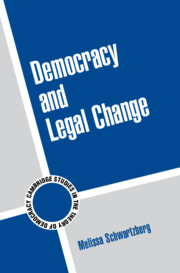Book contents
- Frontmatter
- Contents
- Acknowledgments
- 1 Introduction: Explaining Legal Change and Entrenchment
- 2 Innovation and Democracy: Legal Change in Ancient Athens
- 3 Legislation and Law Reform in Seventeenth-Century England
- 4 Fallibility and Foundations in the U.S. Constitution
- 5 Protecting Democracy and Dignity in Postwar Germany
- 6 Conclusion: Defending Democracy Against Entrenchment
- References
- Index
4 - Fallibility and Foundations in the U.S. Constitution
Published online by Cambridge University Press: 24 July 2009
- Frontmatter
- Contents
- Acknowledgments
- 1 Introduction: Explaining Legal Change and Entrenchment
- 2 Innovation and Democracy: Legal Change in Ancient Athens
- 3 Legislation and Law Reform in Seventeenth-Century England
- 4 Fallibility and Foundations in the U.S. Constitution
- 5 Protecting Democracy and Dignity in Postwar Germany
- 6 Conclusion: Defending Democracy Against Entrenchment
- References
- Index
Summary
The great privilege of the Americans is therefore not only to be more enlightened than others, but to have the ability to make repairable mistakes.
– TocquevilleAs the previous chapters have suggested, debates over legal change often hinge upon the relative competence of various bodies to enact modifications. What sort of expertise should political authorities vested with the power of legal change possess? For example, should “artificial reason” trump the outcome of legislative deliberations? The creation of the U.S. Constitution is, in this regard, no exception. Yet in the United States, these arguments took a distinctive form: The language of amendment during the debates over the Constitution was that of fallibility, both individual and collective. By emphasizing the boundaries of their own reason and the fundamentally experimental nature of their lawmaking, Americans developed a process by which future generations could learn from, and correct, the errors that the new Constitution would inevitably contain.
The framers' concepts of legal change were shaped, of course, both by the unanimity requirement for amendment of the Articles of Confederation and by the state constitutions' amendment procedures. This gave them considerable practical experience with respect to the mechanisms of amendment, yet they turned nevertheless to strikingly abstract discussions of the nature of amendment. In so doing, the language of fallibility served as a touchstone. Such an argument may seem counterintuitive, calling to mind the improbable image of framers struck by insecurity during their deliberations.
- Type
- Chapter
- Information
- Democracy and Legal Change , pp. 115 - 152Publisher: Cambridge University PressPrint publication year: 2007

